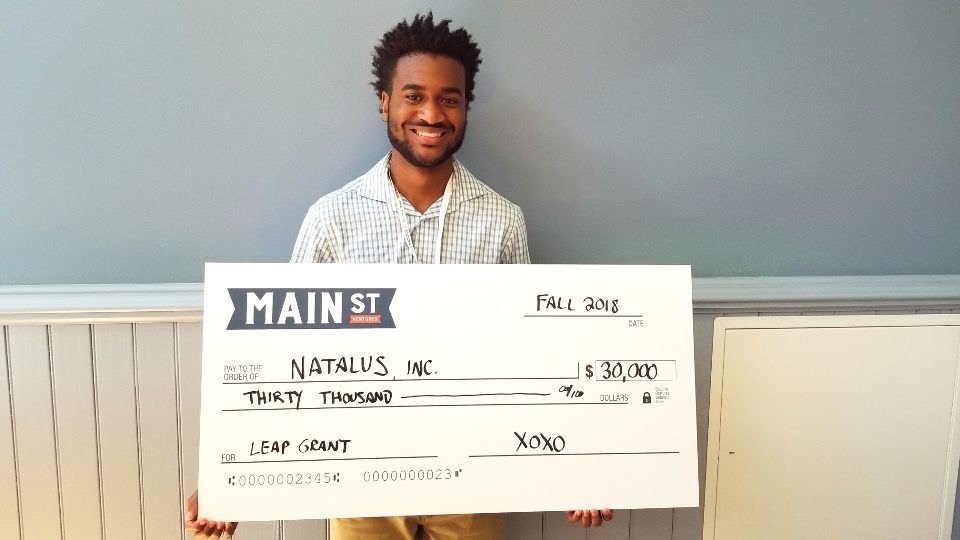
UC student entrepreneur innovates space management technology
One UC engineering student leverages his business savvy in the tech world
Matthew Terry has accomplished a lot during his studies at the University of Cincinnati.
Terry (aerospace engineering ’20) and a team of fellow UC students launched a startup called Natalus, Inc., a software and hardware company that aimed to streamline space management and give new perspective on data visualization problems.
Natalus showed a promising future in the wake of its success at the StartupUC Student Incubator. In 2018, Natalus received $50,000 in funding from the OCEAN Accelerator. Their achievements led to Terry and Natalus co-founders being named on the Cincinnati Inno 25 under 25 awards.
Natalus had built a lot of momentum. Several major corporations expressed interest in Natalus’ unique approach to using LiDaR in stationary positions (as opposed to its most common application, in autonomous vehicles, like drones). The technology uses artificial intelligence and environmental sensors to provide companies with real-time data to manage their space, optimize their operations and save valuable resources.
With their product on the verge of beta testing, Terry, still a full-time student, suddenly found himself at a crossroads. Running a start-up is a 24/7 job, and he was not only an entrepreneur, but also the lead programmer at Natalus.

Matthew Terry has seen his share of success.
Terry cautions fellow entrepreneurs about the risks of burnout in start-ups.
He was not only challenged by constant demands of his growing business and balancing academic and personal priorities, but also people’s reactions — event doubts from family and friends — along the way.
Terry’s experiences in the Edward Prather Summer Bridge program taught him the importance of developing a problem-solving mindset.
Today, he's grateful for the numerous funding and opportunities afforded to him through his experiences at UC and Natalus, including designing his own co-op 2.0 while working at Natalus for several rotations.
Terry is grateful to OCEAN accelerator not just for funding, but also for its central focus on the founders themselves, seeking to mitigate the draining effects of “the lonely journey that often results in the entrepreneur sacrificing everything.”
As he attempted to arrange a more comfortable work-life balance, he discovered a welcome outlet in music; he is currently developing a hip-hop album.
Going forward, Terry is focused on finding technological solutions to improve user experience and increase efficiency.
Since May 2019, Terry has been working as an autonomous drone software engineer with Kelly Cohen, professor (and interim department head) of aerospace engineering. Recently, he spoke at the University of Dayton about his research in Cohen’s lab.

One of Terry’s recent contracts included a fellow UC student’s company, DialGuide, a tool to “help junior sales representatives sell like their senior experienced colleagues.” DialGuide could postively impact the sales productivity and professional development for representatives, as well as client satisfaction.
Terry continues to expand on his research and business applications of the LiDar technology, and there is no lack of viable applications. Companies around the globe in many suffer the costs of poor space management, and Terry’s research could potentially spare the loss of valuable time, money, labor and growth opportunities every minute.
Related Stories
UC students destigmatize stress in nursing
May 7, 2025
UC nurse anesthesia graduate students lead a research-based effort to address stress and burnout in nursing, coping strategies, and the importance of mindfulness and peer support.
Two College Credit Plus high school students receive bachelor’s...
May 4, 2025
Two high school students received bachelor's degrees at the University of Cincinnati's Spring Commencement. Caden Elrod, a senior at Walnut Hills High School in Cincinnati, and Sai Gollamudi, a senior at Centerville High School in Centerville, receive their degrees while also completing their diplomas. They are first high school students in UC's College Credit Plus Program to earn bachelor's degrees.
The UC Alumni Association is now accepting nominations for its...
May 2, 2025
Each year, the UC Alumni Association recognizes and celebrates the many contributions and overall excellence of UC alumni in countless fields of endeavor, throughout the world. Next year’s slate of honorees will be recognized during Alumni Week, April 13-18, 2026 at the UC Alumni Celebration. The UC Alumni Association is currently accepting nominations for its top awards through July 16.
